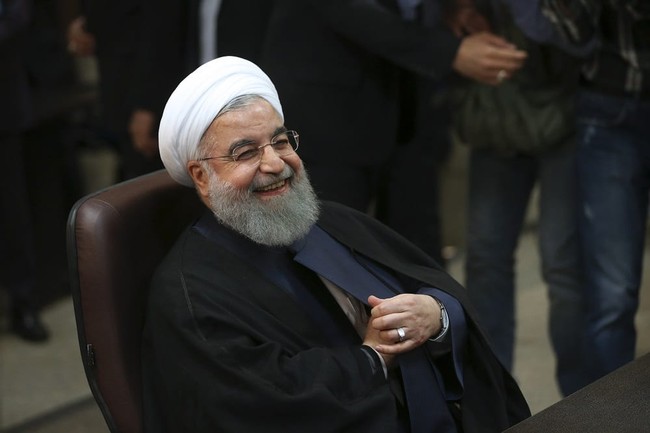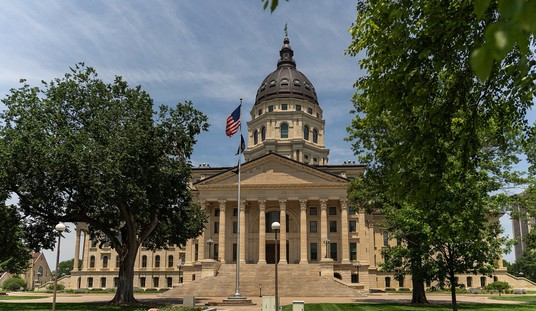
FILE- In this Friday, April 14, 2017 file photo, Iranian President Hassan Rouhani smiles as he attends at the Interior Ministry to register his candidacy for the May 19 presidential elections, in Tehran, Iran. Over 1,600 people registered to run. Under Iranian law, there’s no fee for registering. Hopefuls only must believe in Iran’s form of government and be Shiite Muslims. (AP Photo/Vahid Salemi, File)
A couple of observations about the Thomas Erdbrink piece in the New York Times yesterday. For one, he called President Rouhani a “moderate”, which renders his reporting worse than useless. Rouhani is a hardliner, and anyone who says otherwise is spinning a load of crap. When the Guardian Council approves a set of presidential candidates in elections, they only pick hardliners and somewhat-less hardliners. With Rouhani in charge, the Iranian regime has done or nothing to moderate. He is nothing of the kind.
The first conceit we now know, courtesy of the New York Times’ profile of Deputy National Security Advisor Ben Rhodes, was a myth. Even the U.S. intelligence community recognized that Rouhani was no moderate. This shouldn’t have surprised anyone — he was always the regime’s “Mr. Fix-It,” and had long bragged about having outsmarted the West on how to achieve nuclear aims and how to use diplomacy to pool the wool over credulous diplomats’ eyes.
To argue that enriching Iran might moderate the Islamic Republic simply misunderstands the structure of Iran’s economy as well as the history of past attempts to do just that.
But lest anyone still believe the spin put forward by Rhodes or the echo chamber about which he bragged and Ploughshares Fund rewarded with cash, here is President Rouhani, the so-called moderate, showering with praise Qassem Soleimani, head of the Quds Force and Iran’s master terrorist and with whom Rouhani described a 30-year friendship. As AEI’s Iran research team translated:
If we look at eastern Iran, and not just Iran but also throughout Afghanistan, Iraq, Syria, Lebanon, and Palestine, we see the footprints of General Soleimani’s valor and courage… Today the IRGC is not only burdened with providing for the country’s security. It has also taken the responsibility of providing security in countries that seek Iran’s help… The IRGC is a pioneer for the sacrifice and defense of holy shrines in Iraq and Syria and for the defense of the oppressed in Palestine and Lebanon and other countries that request Iran’s help.
Put aside Iraq and Afghanistan, where Soleimani coordinated the smuggling in of explosively-formed projectiles used to kill several hundred Americans. And put aside Syria, where Iranian intervention has contributed to hundreds of thousands of deaths and an order of magnitude greater number of refugees. Instead, consider “Palestine,” where Soleimani’s partners are not the Palestinian Authority or those seeking to live side-by-side with Israel, but rather Hamas and Palestinian Islamic Jihad — both of which dedicate themselves to the elimination of Israel and any Jewish presence in the region, in effect, seeking genocide.
To endorse such life’s work suggests not only is Rouhani complicit in endorsing if not enabling terrorism, but also that pumping billions of dollars into the Iranian economy is having the opposite effect than that which President Obama and Secretary of State John Kerry promised.
Second thing. All non-Iranian journalists in Iran have to register with the Ministry of Culture and Islamic Guidance so, basically, in order to gain access, they become mouthpieces for the regime, helping to transmit Mullah propaganda. It’s what happens when you have minders watching everything you’re doing.
The ability to report without impediment is also obstructed by an elaborate system of surveillance of foreign journalists, which includes keeping a close eye on the translators and local fixers hired by international reporters.
“They have to work with a minder,” says Kelly Niknejad, a Boston-based Iranian-American journalist. “When you’re a foreign journalist and you’re dependent on a stringer or journalist, you’re much better controlled… And they also keep an eye on your minder – it kind of prevents the minder from developing a relationship with the reporter. Usually there’s two levels of minders for every foreign journalist.”
This is not new. When Ahmadinejad won for the first time in 2005, reporting by foreigners in Iran was restricted by minders. Here is a report from 2004.
Unlike most journalists in Iran, I am here on a tourist visa, not a press visa, which means there is no government minder controlling where I go and whom I talk to. It also means I am afforded none of the limited privileges and protection given to accredited journalists. If I am caught with four previously jailed dissidents, I will almost certainly be arrested as a spy.
After months of negotiating access, Kokan is finally able to enter Iran in September 2003. Pretending to be an archaeologist, she crosses the Turkish border with a group touring the country’s ancient ruins. Once inside, Kokan is assigned an official minder and her hotel room and phone are monitored. She must be extremely careful as she tries to make contact with Iran’s underground student movement. She slips out at night to communicate by email, using a secret code she’s developed to communicate with colleagues and sources. But she is careful to return by curfew or risk the hotel receptionist’s reporting her to the police.
One night, Kokan shakes her minder to meet a friend of imprisoned student leader Fakhravar. Kokan pledges to protect the friend’s identity, and he describes the ever-present security forces in Iran and the impact of a police state on daily life. “Our dream country is one where human rights are respected,” he tells Kokan, “where people aren’t sent to prison and tortured for their ideas, for their writing, for their work. That’s our dream country.”
Dodging her minders again, Kokan finds and films the anonymous site in Shiraz where journalist Zahra Kazemi’s body is buried.
Real reporting only really happens when journalists are able to shake free from Iranian agents. When your movements and reporting are monitored by minders, it’s pretty easy to interview government-approved interviewees who spout the government-approved line. Michael Rubin caught that with Erdbrink.
“After years of cynicism, sneering or simply tuning out all things political,” wrote Erdbrink, “Iran’s urban middle classes have been swept up in a wave of nationalist fervor.” He went on: “Mr. Trump and the Saudis have helped the government achieve what years of repression could never accomplish: widespread public support for the hard-line view that the United States and Riyadh cannot be trusted.”
Erdbrink’s argument echoed rhetoric from Iranian Foreign Minister Javad Zarif. Responding to October’s announcement of new U.S. sanctions against the Islamic Revolutionary Guard Corps, Zarif tweeted: “Today, Iranians–boys, girls, men, women–are ALL IRGC.”
Given all this, the only reasonable conclusion that should be made is that anything the regime says must be viewed with skepticism and suspicion. Much of the mainstream media has been irresponsible in its reporting of events in Iran. Why? Because we seldom hear correspondents mention whether or not they are accompanied by government minders. Why is that? If they have press visas, we must assume they are so accompanied by the mullahs’ eyes and ears. With a “security official” looking over a journalist’s shoulder, the “man on the street” is going to spout the party line. If he doesn’t, jail awaits. This is not a reporting of the actual situation or the state of mind of the people. It’s party-line propaganda disguised as objective reporting (unless the minders are actually mentioned). When reporters are shown crowded polling stations by government officials or are invited to attend pro-regime rallies, does that reflect the reality of the situation on the ground? Not even.
Bottom line, we are better off getting social media reports from everyday Iranians who are brave enough to tell us what’s really going on, not by paid professionals who are followed by government agents looking over their shoulders. By the way, Reporters Without Borders ranks Iran 165th in press freedom, out of 180 countries measured.












Join the conversation as a VIP Member